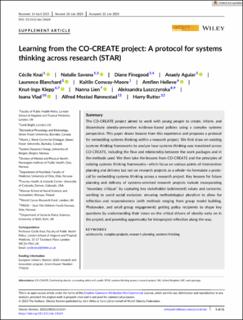| dc.contributor.author | Knai, Cécile | |
| dc.contributor.author | Savona, Natalie | |
| dc.contributor.author | Finegood, Diane | |
| dc.contributor.author | Aguiar Rodriguez, Anaely | |
| dc.contributor.author | Blanchard, Laurence | |
| dc.contributor.author | Conway-Moore, Kaitlin | |
| dc.contributor.author | Helleve, Arnfinn | |
| dc.contributor.author | Klepp, Knut Inge | |
| dc.contributor.author | Lien, Nanna | |
| dc.contributor.author | Luszczynska, Aleksandra | |
| dc.contributor.author | Vlad, Ioana | |
| dc.contributor.author | Rønnestad, Alfred Mestad | |
| dc.contributor.author | Rutter, Harry | |
| dc.date.accessioned | 2023-12-08T12:30:33Z | |
| dc.date.available | 2023-12-08T12:30:33Z | |
| dc.date.created | 2023-10-11T11:08:19Z | |
| dc.date.issued | 2023 | |
| dc.identifier.issn | 1467-7881 | |
| dc.identifier.uri | https://hdl.handle.net/11250/3106628 | |
| dc.description.abstract | The CO-CREATE project aimed to work with young people to create, inform, and disseminate obesity-preventive evidence-based policies using a complex systems perspective. This paper draws lessons from this experience and proposes a protocol for embedding systems thinking within a research project. We first draw on existing systems thinking frameworks to analyze how systems thinking was translated across CO-CREATE, including the flow and relationship between the work packages and in the methods used. We then take the lessons from CO-CREATE and the principles of existing systems thinking frameworks—which focus on various points of intervention planning and delivery but not on research projects as a whole—to formulate a protocol for embedding systems thinking across a research project. Key lessons for future planning and delivery of systems-oriented research projects include incorporating “boundary critique” by capturing key stakeholder (adolescent) values and concerns; working to avoid social exclusion; ensuring methodological pluralism to allow for reflection and responsiveness (with methods ranging from group model building, Photovoice, and small group engagement); getting policy recipients to shape key questions by understanding their views on the critical drivers of obesity early on in the project; and providing opportunity for intraproject reflection along the way. | en_US |
| dc.language.iso | eng | en_US |
| dc.publisher | Wiley | en_US |
| dc.rights | Navngivelse-Ikkekommersiell 4.0 Internasjonal | * |
| dc.rights.uri | http://creativecommons.org/licenses/by-nc/4.0/deed.no | * |
| dc.title | Learning from the CO-CREATE project: A protocol for systems thinking across research (STAR) | en_US |
| dc.type | Journal article | en_US |
| dc.type | Peer reviewed | en_US |
| dc.description.version | publishedVersion | en_US |
| dc.rights.holder | Copyright 2023 The Author(s) | en_US |
| dc.source.articlenumber | e13624 | en_US |
| cristin.ispublished | true | |
| cristin.fulltext | original | |
| cristin.qualitycode | 1 | |
| dc.identifier.doi | 10.1111/obr.13624 | |
| dc.identifier.cristin | 2183656 | |
| dc.source.journal | Obesity Reviews | en_US |
| dc.identifier.citation | Obesity Reviews. 2023, 24 (S2), e13624. | en_US |
| dc.source.volume | 24 | en_US |
| dc.source.issue | S2 | en_US |

